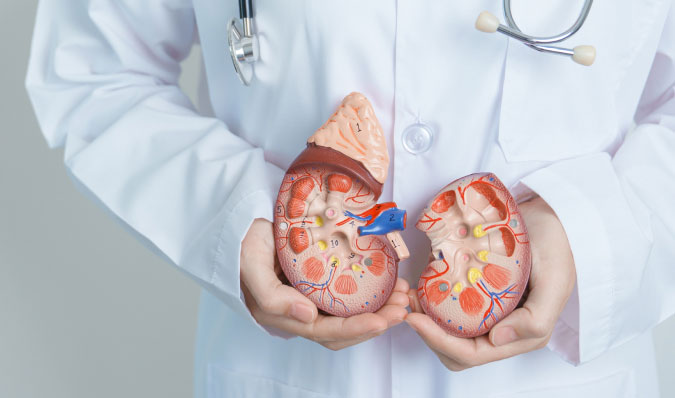Kidney Cancer Treatment in Singapore
Minimally Invasive
Long-term Support

of Experience


Care & Support
Early detection of kidney cancer goes a long way.
Timely intervention can make a major difference in treatment complexity and outcomes.
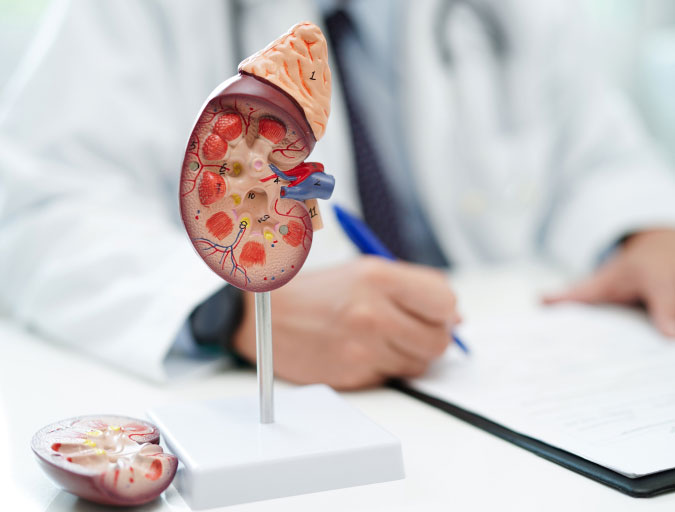
What Is Kidney Cancer?
The kidneys are two bean-shaped organs located in the upper abdomen, one on each side of the spine. They are responsible for filtering waste products and excess fluids from the blood to produce urine. Kidney cancer develops when the cells in one or both kidneys undergo changes that cause them to grow and divide in an uncontrolled manner.
The most common type of kidney cancer in adults is renal cell carcinoma (RCC), which accounts for more than 90% of cases. Other less common types include transitional cell carcinoma, Wilms tumour (more common in children), and renal sarcoma.
What are Common Symptoms of Kidney Cancer?
In its early stages, kidney cancer may not cause any noticeable symptoms. It is often detected incidentally during imaging tests for unrelated conditions. However, as the cancer progresses, it may cause the following symptoms:
- Blood in the urine (haematuria), which may appear pink, red, or brown
- Persistent pain in the back or side, just below the ribs
- A lump or mass in the abdomen or side
- Unexplained weight loss
- Fatigue
- Fever not caused by infection
- Loss of appetite
- Swelling in the legs or ankles
If you experience any of these symptoms, it is important to consult a urologist for further evaluation.

Notice any of the above symptoms?
Call 6518 3622 to schedule an evaluation with a kidney cancer specialist today.
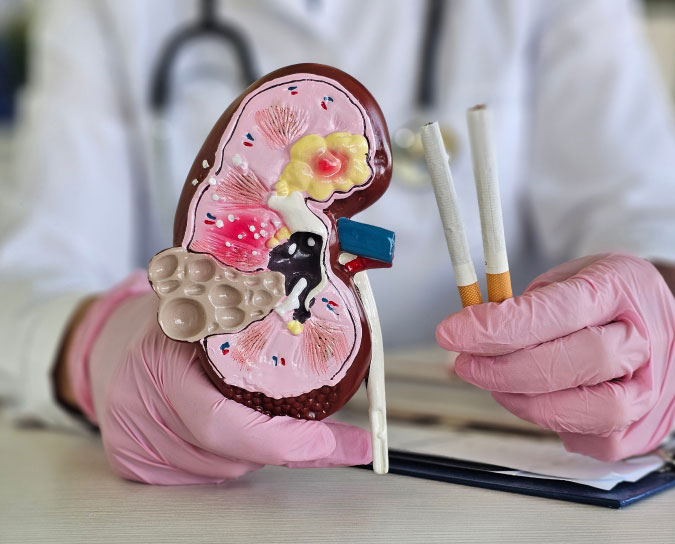
What are the Risk Factors of Kidney Cancer?
While the exact cause of kidney cancer is not always known, certain factors may increase the risk of developing the disease. These include:
- Smoking: Cigarette smoking is one of the strongest risk factors for kidney cancer
- High blood pressure: Chronic hypertension has been linked to an increased risk of renal cell carcinoma
- Obesity: Excess body weight may alter hormone levels, which can contribute to kidney cancer development
- Family history: Individuals with a close relative who has had kidney cancer may have a higher risk
- Long-term dialysis: People on long-term dialysis for kidney failure are at greater risk of developing cysts that can become cancerous
How is Kidney Cancer Diagnosed?
Diagnosis involves a detailed medical history and physical examination, followed by diagnostic imaging and laboratory tests.
The following procedures are commonly used:

Ultrasound
Often the first imaging test performed to evaluate a kidney mass
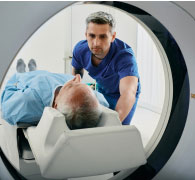
CT scan (computed tomography)
Provides more detailed images of the kidneys and surrounding organs
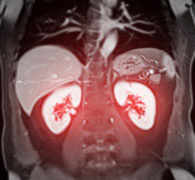
MRI (magnetic resonance imaging)
Useful for assessing the extent of the tumour and involvement of blood vessels

Urinalysis
To check for blood or cancer cells in the urine

Blood tests
May reveal abnormalities in kidney function or signs of anaemia
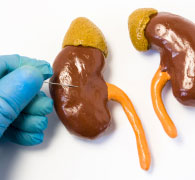
Biopsy
In selected cases, a needle biopsy may be performed to obtain tissue for analysis
Kidney Cancer Staging
Staging describes how far the cancer has spread and helps guide treatment decisions. The most widely used system is the TNM (Tumour, Node, Metastasis) classification:
STAGE I
Tumour is confined to the kidney and measures less than 7 cm
STAGE II
Tumour is still confined to the kidney but is larger than 7 cm
STAGE III
Cancer has spread to nearby lymph nodes or blood vessels
STAGE IV
Cancer has spread to distant organs such as the lungs, bones, or liver
What are the Treatments for Kidney Cancer in Singapore?
Treatment for kidney cancer depends on the stage of the disease, overall health, and the function of the affected kidney.
The main treatment options include:
Kidney Cancer Surgery
Surgical removal of the tumour is the most common treatment for localized kidney cancer. There are two main types of surgery:
- Partial nephrectomy: Also known as nephron-sparing surgery, this involves removing only the cancerous part of the kidney. It is preferred when the tumour is small and confined.
- Radical nephrectomy: This procedure removes the entire kidney along with surrounding fatty tissue and, in some cases, nearby lymph nodes or adrenal gland.
Both open and minimally invasive (laparoscopic or robotic-assisted) techniques are available in Singapore.
Ablative Therapy
For selected patients who are not suitable for surgery, radiofrequency ablation (RFA) or cryoablation may be used to destroy cancer cells using heat or cold, respectively.
Targeted Therapy
These medications target specific molecules involved in cancer growth and spread. They are typically used in advanced or metastatic kidney cancer and include drugs that block blood vessel growth or disrupt cancer cell signaling.
Immunotherapy
Immunotherapy helps the body’s immune system recognise and attack cancer cells. Immune checkpoint inhibitors such as nivolumab or pembrolizumab have become an important option for advanced kidney cancer.
Active Surveillance
In cases where the tumour is small, slow-growing, and not causing symptoms, active surveillance may be considered. This involves regular imaging to monitor tumour growth before initiating treatment.
Can Kidney Cancer be Prevented?
While not all kidney cancers can be prevented, maintaining kidney health plays an important role in lowering your risk. Here are some tips:
- Quit smoking and avoid tobacco use
- Maintain a healthy body weight
- Control blood pressure through lifestyle or medication
- Stay hydrated with adequate fluid intake
Regular health check-ups and imaging may help detect kidney abnormalities early, especially in individuals with risk factors or a family history of kidney disease.


Our Kidney Cancer Specialist
Dr Tan Teck Wei
MBBS (S’pore), DFD (CAW), MRCS (Edin),MMed (Surgery), FAMS (Urology)
Dr Tan Teck Wei is a Senior Consultant Urologist and former Director of Genitourinary Oncology at Tan Tock Seng Hospital. Skilled in the management of kidney cancer, Dr Tan strives to provide empathetic and effective care with the patient’s best interests in mind. He is fellowship-trained in open, laparoscopic and robotic urologic surgery; and has held numerous leadership and academic positions. Dr Tan understands the distress faced by patients and their families, and is committed to providing care that is not only medically sound but also supportive, personalised, and attuned to each patient’s circumstances.
FAQs on Kidney Cancer
Most early-stage kidney cancers do not cause symptoms. When symptoms appear, they may include blood in urine, persistent flank pain, or a lump in the side or lower back.
Yes, especially when detected early. Localised kidney cancer can often be cured with surgery, such as partial or radical nephrectomy.
It is usually found through imaging such as an ultrasound or CT scan, often incidentally during health checks or scans for other conditions.
Yes, most people can live normal lives with one kidney if the other is healthy.
Chemotherapy is seldom used. Advanced cases may be treated with targeted therapy or immunotherapy instead.
For enquiries on your condition or appointment booking, please fill in the enquiry form and we will be in touch with you soon. Your health and well-being are our top priorities, and we look forward to assisting you on your medical journey.
